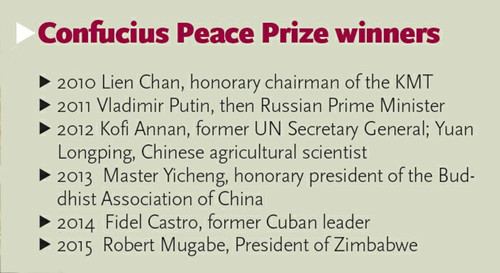
Facing widespread criticism, the Confucius Peace Prize Committee that was born as a "correction to the Nobel Peace Prize" has continuously faced claims that it is not credible. The founders argue that they are serious about promoting the "Chinese understanding" of peace.
In a repeat of previous years, the sixth Confucius Peace Prize in China, an annual event organized by an NGO, has been the subject of criticism and ridicule after its latest recipient was announced.
This year, Robert Mugabe, president of Zimbabwe since the 1980s, was voted the winner, beating nine other shortlisted candidates including South Korean President Park Geun-hye, Microsoft founder Bill Gates and Buddhist Master Hsing Yun from Taiwan.
Several foreign media outlets questioned the choice, saying that the organizers were paying tribute to a "war-monger" and "sadist" who has used "systematic violence and torture" to maintain his 35-year rule over the country.
When reports came that Mugabe would not collect his award, many domestic media outlets and netizens launched a new wave of criticism towards the prize committee, accusing it of copycatting, using the name of Confucius to make money, acting in a farcical manner and even damaging the international image of China.
The committee has since admitted its inadequate organizational and financial abilities. However, it refuted all the accusations of profit-seeking, saying that it is simply trying to give China its own peace prize to promote Chinese people's understanding of peace.
"We have reached a consensus of 'three noes', no investment, no earning profits, no clique," Liu Zhiqin, the initiator of the prize and senior fellow at the Chongyang Institute for Financial Studies at Renmin University of China, told the Global Times.
"The different opinions about the prize are understandable. But I think the criticisms will help us to grow, instead of frustrating us," he said, adding that they will not stop awarding the prize unless the government actually bans them from doing so.
Kong Qingdong, a professor from the Peking University and one of the 76 people on this year's panel of judges, responded more directly, calling critics of the prize "traitors" on his Weibo.
The award ceremony will be held in Beijing on December 9. Liu said they are still waiting for a reply from the Zimbabwean Embassy in China regarding Mugabe's acceptance of the prize.
'True face' of peace
The idea for a Confucius Peace Prize began with an opinion piece written by Liu Zhiqin, then the Chief Representative of the Beijing Branch of the Switzerland-based Zürcher Kantonal Bank. Titled "China needs to set up a Confucius Peace Prize," Liu wrote in November 2010 that China needs to establish its own prize to "declare China's view of peace and human rights to the world."
Liu Zhiqin said he had the idea following the controversy over the Nobel committee's decision to give the peace prize to Liu Xiaobo, who was sentenced to 11 years in prison for agitation activities to subvert the Chinese government in December 2009.
"I was cheered by the article and decided to put the theory into action," recalled Qiao Wei, a poet who writes under the pen name of Qiao Damo, chairman of the China International Peace Research Centre (CIPRC) which is registered in Hong Kong and now runs the Confucius Peace Prize.
Three weeks later on December 8, 2010, the first Confucius Peace Prize was awarded to Lien Chan, honorary chairman of the Kuomintang, Taiwan's ruling party, for his contribution to communication the across the straits.
"The Nobel Peace Prize gradually started showing more and more intense ideological coloring, quietly becoming a tool in the hands of Western countries to cause peaceful revolution against political regimes that did not meet their standards," the Confucius Peace Prize Committee said in a statement in March 2012.
The birth of Confucius Peace Prize is "in some sense a correction to Nobel Peace Prize, hoping in the near future to guide it to gradually see the true face of peace," they added.
"Our selection process has been open, justified and dependent. All the candidates and judges were announced in advance on the Internet," Qiao told the Global Times.


















































